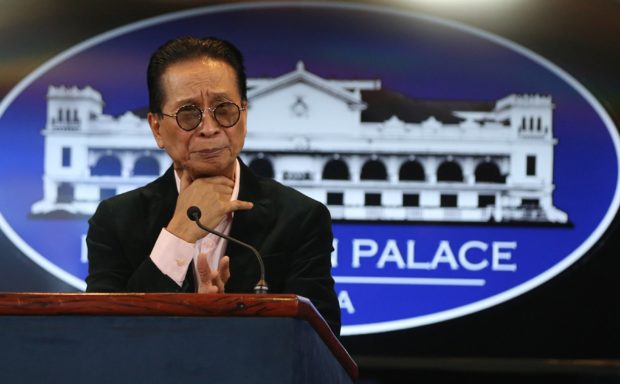Palace blasts US docufilm on Duterte as ‘derogatory, biased’

Presidential spokesperson Salvador Panelo (File photo by JOAN BONDOC / Philippine Daily Inquirer)
MANILA, Philippines — Malacañang slammed Tuesday as “derogatory and biased” the US documentary film “On The President’s Orders,” which looked into the bloody war on drugs of President Rodrigo Duterte.
“The Palace is vexed by the continuous spread of disinformation against our country’s campaign against illegal drugs and criminality,” presidential spokesperson Salvador Panelo said in a statement.
“Foreign audiences have been saturated with false and baseless narratives relative to the Philippine government’s anti-narcotics approach, specifically on the nature and number of deaths arising from police operations against it,” he added.
The Palace official said the US docufilm appeared to be the latest addition to the “unmitigated vilifications” against Duterte.
“Even the title of the docufilm reeks with malice, making it appear that the drug-related deaths were done upon the orders of [Duterte],” he said.
Article continues after this advertisementPanelo noted that “(a)s mentioned in the docufilm’s website, caught (on) camera are ‘the victimized slum communities and the police squads blithely executing their countrymen from a perverse moral high ground.’”
Article continues after this advertisement“We find this derogatory and biased, if not outright fiction. It is obvious that the film medium is riding on the coattails of the President’s international popularity and success, and is being used as a medium to espouse one-sided information bordering to black propaganda aimed at gullible foreign audiences who know little or zero-knowledge about the Philippines and its government,” he said.
He further pointed out that “in creating a film, it is easy to select fractions of video clips or soundbites that serve the purpose of the filmmakers in falsely portraying a dangerous Philippines and a murderous government while omitting scenes that reflect the opposite.”
“Moviegoers,” Panelo said, “are more inclined to watch a thrilling film that depicts a country as menacing instead of a lackluster motion picture showcasing its progress and development.”
“Those who will watch the movie is advised and informed that the Philippines is an archipelago where the illegal drug trade is a billion-peso industry, in that 97% of small villages which we call barangays, have or had already been infiltrated,” he added.
Panelo, who is also Duterte’s chief legal counsel, maintained that “the government’s campaign against prohibited narcotics is anchored primarily on national security and public safety.”
He also reiterated that “drug-related killings are absolutely not state-initiated nor state-sponsored.”
The “killings result from violent resistance on the part of those sought to be arrested by police agents, proof of which is the death of scores of policemen and serious injuries to hundreds of others,” Panelo said, adding that “a number of these deaths is also caused by members of the prohibited drug industry who kill each other because of, among others, rivalry, botched deals and swindling.”
“The President, as a strict enforcer of the law, does not tolerate abusive police officers,” he also said. “They are not – and will never be – exempted from administrative sanction and criminal prosecution should there be abuse on their part.”
He then echoed Duterte’s line in his State of the Nation Address that “those who abuse their authority will have hell to pay.”
“The docufilm, together with its so-called cinematic investigation on drug-related deaths, evidently has been deliberately overdramatized for the purpose, apart from putting the Philippines in a bad light, of creating a better cinematic experience for its audience,” Panelo said. “We caution its potential viewers to be circumspect in evaluating the truthfulness of the film.”
Since Duterte launched his brutal war on drugs in 2016, data from the Philippine Drug Enforcement Agency showed that 5,526 mostly poor Filipinos were killed from July 1, 2016, to June 30, 2019. /kga